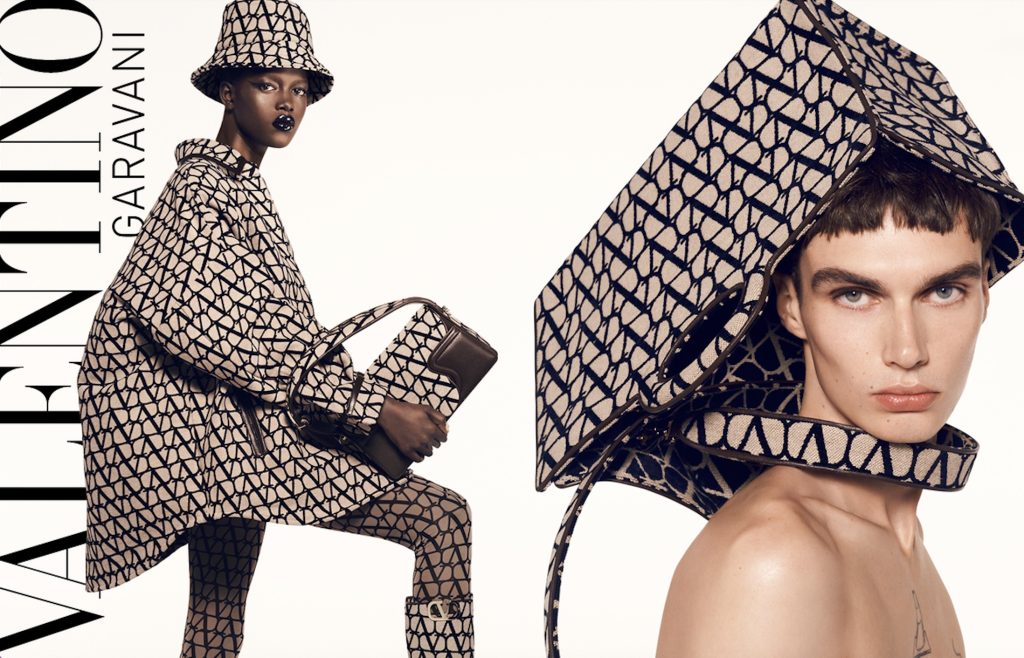Valentino and a high-fashion textile firm are at odds over where a matter accusing the well-known fashion brand of “taking, using and copying [its] designs and swatches,” passing them off as its own designs, and failing to pay for them should be heard. In an order early this month, a New York federal sided with Valentino in the copyright infringement, unjust enrichment, misappropriation of trade secrets, conversion, breach of contract, and unfair competition lawsuit waged against it by Mrinalini, granting the fashion brand’s motion to compel arbitration and stay the case, and denying Mrinalini’s motion to enjoin the arbitration. Counsel for Mrinalini is now pushing back against the court’s decision, urging Judge Mary Kay Vyskocil of the U.S. District Court for the Southern District of New York to reconsider her order.
The Background: Aside from allegedly “passing off” Mrinalini’s work as its own, including copyright-protected fabric designs, which Valentino allegedly co-opted for its couture collections, Mrinalini also accused Mayhoola-owned Valentino of misappropriating its trade secret sewing techniques. Despite agreeing to keep such information confidential, Mrinalini alleged in its March 2022 complaint that Valentino employees shared the proprietary stitching techniques with “other suppliers, including Mrinalini competitors, apparently in an unscrupulous effort to source … large quantities of clothing for Valentino … [from] the cheapest supplier, all without permission from Mrinalini.”
Last year, in response to New York-based Mrinalini’s lawsuit, Valentino moved to dismiss the complaint for failure to state a claim or in the alternative, it sought to compel arbitration and stay the case on the basis that it entered into a new agreement with Mrinalini in 2014 that contained an arbitration clause that provided that “[a]ny dispute that may arise connected to the agreement as well as associated or connected to its execution, interpretation, enforcement, [or] validity, shall be referred … to a sole arbitrator appointed by the Milan Chamber of Arbitration.”

Mrinalini opposed the motion to dismiss and filed a motion to enjoin a separate arbitration in Italy that Valentino previously initiated, arguing that “the claims brought in that arbitration (like those brought here) are outside the scope of the relevant arbitration agreement.” (Specifically, Mrinalini argued that the agreement “relates to only one aspect of the parties’ relationship – namely, [its] manufacturing of products based on Valentino’s designs,” while the dispute here “pertains to an entirely separate aspect of their relationship – specifically, Mrinalini’s manufacturing of products using its own designs.”)
SDNY Order: In her March 1 order, SDNY Judge Mary Kay Vyskocil: (1) granted Valentino’s motion to compel arbitration and stay the case; and (2) denied Mrinalini’s motion to enjoin the arbitration.
In deciding to compel arbitration, the judge stated that the court “need not decide whether the current dispute falls within the scope of the [parties’] agreement, [as] the agreement, by its terms, expressly commits to arbitration ‘any dispute … associated or connected to its execution, interpretation, enforcement, [or] validity.’” Given that the parties “disagree over what constitutes an arbitrable matter under the agreement and addressing that dispute will necessarily entail the resolution of some ‘enforcement’ or ‘interpretation’ of the agreement,” Judge Vyskocil found that “the parties have clearly and unmistakably assigned to the arbitrator the question of whether Mrinalini’s claims set out an arbitrable dispute.”
The “only remaining question” is whether the action should be stayed or dismissed pending arbitration, the court stated, asserting that the Federal Arbitration Act “requires a district court, ‘on application of one of the parties,’ to stay an action after determining that ‘any issue’ in the action is ‘referable to arbitration.’” Here, Valentino “requested a stay, but only in the alternative to dismissal,” according to the court, which noted that “certain courts in this district have held that, under such circumstances, the court ‘has discretion in determining whether to stay or dismiss the case pending arbitration.’”
“But whether the stay is mandatory or discretionary makes no difference in this case,” per Judge Vyskocil, as the Second Circuit has held “that courts should stay litigation pending arbitration to avoid converting an otherwise unappealable interlocutory stay order into an appealable final dismissal order, thus enabling parties to proceed to arbitration directly.” Moreover, the judge held that a “stay is particularly appropriate where, as here, the parties must arbitrate the question of arbitrability” of Mrinalini’s claims, as “any claims that the arbitrator determines are not arbitrable would proceed before this court.”
Since the plain language of the parties’ agreement delegates the question of arbitrability to the arbitrator, the court ultimately found that it is “appropriate to compel arbitration and stay all proceedings in this action pending arbitration.” As for the arbitration underway in Italy, the court refused to put a stop to it “for the same reason” that it granted Valentino’s motion to compel arbitration of the claims Mrinalini brought in its lawsuit: the agreement “clearly and unmistakably assigns the issue of arbitrability to the arbitrator.”
Reconsideration + Opposition: Fast forward to March 6, and Mrinalini asked the court to reconsider its order because it “did not consider the correct ‘agreement’ in concluding that Mrinalini consented to have an arbitrator decide issues of arbitrability.” The agreement that the court considered is “not the General Purchasing Conditions, alone,” per Mrinalini, and thus, it “must [also], by definition, include purchase orders.” At the same time, Mrinalini asserts that “it is not only not ‘clear and unmistakable’ that Mrinalini agreed to arbitrate its intellectual property claims; it is highly implausible.”
The company – which alleges that it has maintained a relationship with Valentino for over fifteen years, starting work with it back in the early 2000s – also argues that the court should reconsider its decision to stay the case in favor of arbitration, as the court assumed that such arbitration is taking place in this district. However, the arbitration is actually taking place in Milan, which is an issue as “the court cannot compel arbitration outside of the district.”
In a filing of its own on March 20, Valentino characterizes Mrinalini’s motion for reconsideration as “a waste of resources” since it already made its argument about the parties’ relationship being governed by two agreements (in opposing Valentino’s motion to dismiss and in support of its own motion to enjoin the arbitration), and “especially since the sole arbitrator in the parties’ arbitration before the Milan Chamber of Arbitration issued his Final Award on March 9.” (According to Valentino, the Final Award “found that nearly all of Mrinalini’s claims here are arbitrable and resolved Mrinalini’s claims in Valentino’s favor, [and] Mrinalini concedes as much.”)
The case is Mrinalini, Inc v. Valentino S.p.A., et al., 1:22-cv-02453 (SDNY).











